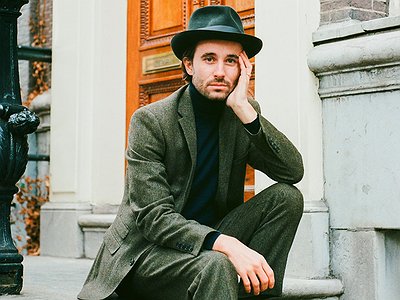Part 2
How do you make use of technology? In terms of the feedback mechanism between technology and creativity, what do humans excel at, what do machines excel at?
Technology informs creativity and vice versa. Technology helps me understand orchestral music for example. Having instant access to hundreds of sounds and articulations give me the opportunity to create orchestral music, even though I might not follow and understand all the rules of traditional orchestration. On the other hand, I use my creativity to control technology, so I can use those orchestral sounds and put them in a completely different context, into something they weren’t actually designed for. I can also use those sounds and affect them further, using technology again, so it’s an ongoing cycle and interplay of the two.
I see humans and machines playing alongside each other, machines and technology are so far advanced that we almost can’t imagine being without them. Without having to go too deep, I’d probably say that the human emotion is something that machines don’t excel at. Technology probably would have a counter argument, saying that emotions are calculable, since it is just atoms and electrons that are being moved around in the body. But in terms of music and AI, I feel that we are still quite far away from machines imitating human emotions and elements. At the moment, I feel that the human touch is needed to make someone really feel something, sad, angry, happy and so on.
Collaborations can take on many forms. What role do they play in your approach and what are your preferred ways of engaging with other creatives, including the artists performing your work?
I love collaborating in many ways. I grew up playing in bands, it’s a wonderful thing if a few friends come together and create something perceived as one. So, for me, music has always been about collaboration and communication.
Now I have shifted my work more into the studio, collaborating is still important, but it has taken a different shape. I write things and then musicians play and interpret my ideas and vision, which I also think is very magical. One of the most wonderful moments was when I wrote a score and a large orchestra played it at AIR studios in London. So, you have those hours of composing and figuring out things, and then this large group of musicians playing it all in real time with real instruments in this beautiful sounding building, pure magic!
Another way of collaborating is as a film scorer, you collaborate with the director, you are on the other end of the stick, meaning you take directions and help fulfill visions, which I also really like from time to time, it’s like having certain boundaries and within those you have to shine and be as creative as possible. It also means there’s an end to the process, which is when the director signs off your cues. When you create your own material, no one signs it off, you have to decide when it’s finished and sometimes this is difficult.
I have recently started playing and creating things live again, with other musicians, and there’s something liberating about it, I still think it’s my favourite way of collaborating.
How is writing the music and having it performed live connected? What do you achieve and draw from each experience personally? How do you see the relationship between improvisation and composition in this regard?
Improvisation and composition are very closely related. Improvisation is making things up on the spot right, but isn’t composition the same? You create new things, a new melody, you make it up on the spot. Of course, in composition you have the time to go back and change it and perfect it, within an improvisation time has passed and you won’t be able to change it. But without diverting too much and to answer your question, I love the live element of an interpretation of a composition. With a composition, you spent hours and hours perfecting things and countless nights by yourself figuring out a chord change, sound or a melody - which I also find hugely satisfying once you know when you arrive at the perfect combination. With a live performance, whether it’s me performing or someone else, I love when the player feels the moment, maybe changes a few things here and there, that’s the whole point of playing live for me. Of course, I understand that in a traditional classical piece with 80 players not everyone can improvise wildly, yet still the interpretation, dynamics, intensity etc, can all be improvised and interpreted slightly differently, feeling the atmosphere of the night.
Time is a variable only seldom discussed within the context of contemporary composition. Can you tell me a bit about your perspective on time in relation to a composition and what role it plays in your work?
Time is very precious. It ties in with your question of an ideal state of mind. Being 100% focussed and making the best use of your time is something that I try to do every day. In everyday work, let’s say scoring a film, TV, advert or writing music for Spitfire Audio, I try to perfect my working process and become faster in writing, so I have time to do all the other things I’ve described above. Time isn’t on our side and I feel the older I get the less time I have for wasting. Maybe I’m mistaken here, as everything is so fast paced, maybe we should take more time to create our art, but how much time is too much, or too little?
How do you see the relationship between the 'sound' aspects of music and the 'composition' aspects? How do you work with sound and timbre to meet certain production ideas and in which way can certain sounds already take on compositional qualities?
The sound is absolutely important, it informs the composition. Actually, the sound is part of the composition. I like to compare it with cooking; let’s say a meal everyone knows, lasagne. If all the onions, tomatoes and herbs for the tomato sauce are perfectly cut and cooked the exact right time, it’s not going to taste good if the tomatoes weren’t sun-kissed, the onion was old and the herbs were rotten. I’d actually say, everyone can learn how to chop up the ingredients and stop the timer for exact cooking time, but the quality of the ingredients, that’s where the real magic lies.
So, what I’d like to say is that I spend a lot of time shaping sounds and timbres, before I even start the actual composition, the harmony and melody if you will. Of course, as with my “Santa Teresa” example, I’ve had the melody first and then looked for a timbre, so here and there, it's the other way around.
Our sense of hearing shares intriguing connections to other senses. From your experience, what are some of the most inspiring overlaps between different senses - and what do they tell us about the way our senses work? What happens to sound at its outermost borders?
Music can make you let go of everything and sound can actually help you achieve the perfect state of mind. But in my experience, it isn’t only the music itself, it's surroundings, the people you’re with, the experiences you’ve had, the experiences you are about to have, everything is connected, all the senses are connected. Music is one, very important, means of transportation towards that state of mind.
You know when you walk through the street and you smell the perfume you smelled on your father when you were a child and it brings you instantly back? This is exactly the power music has as well, even stronger. One of the strongest sensations I have is when I listen to ‘40 Day Dream’ or ‘Home’ by Edward Sharpe & The Magnetic Zeros, it may not be my favourite ever song, but wow the emotions and sensations that come up touch all my senses. It was when I fell in love with my wife and we were dancing like crazy at their concert at The Old Vic Tunnels in London. So, I guess music can really transport you through time as well.
Art can be a purpose in its own right, but it can also directly feed back into everyday life, take on a social and political role and lead to more engagement. Can you describe your approach to art and being an artist?
For me it’s the only thing I can imagine doing when getting up in the morning - I love to create and to share. If I find my way into being relevant to someone else’s life, then that’s even better.
My first album is a very personal one, it’s like handing over my diary I’ve written over the course of two years. It’s a personal collection, point of view and way of dealing with the happenings of life. In a way, it also dealt with letting go, so I’d hope for the listener to find joy and ambition through my music, maybe make their own personal connection to some of the tracks. ‘For A Troubled Mind’ for example is a track written for someone who deals with mental health issues and it’s supposed to have a soothing effect, but I ended up interpreting my own feelings towards dealing with a person with those issues, so it’s a double-edged sword kind of story. ‘A Stone’s Throw’ wants to say that we are all connected, nothing is far away, we are all from this planet earth, and that’s the main and most valuable quality we all have in common, humans, animals, and nature. In a more everyday way, the track should make your journey hopeful and happy, hence the bouncy feel. I also mix several genres and styles together in this one track, showcasing the different cultures working together as one. Some tracks such as ‘Max’ or ‘Starchild’ deal with loss and maybe give someone else courage when they’re in the same position.
I guess with these examples, I am explaining what your question is really, direct feedback into everyday life experiences. And I think this is art in its purest and most honest form, and I’d hope for the consumer of my art to perceive it like this.
It is remarkable, in a way, that we have arrived in the 21st century with the basic concept of music still intact. Do you have a vision of music, an idea of what music could be beyond its current form?
It is possible that scientists and software programming will take over music eventually. Yes, we are saying that the human element will always be needed to create art and emotional music, but let’s look at how fast music has moved and people are hungry for new things. The electric guitar has become popular in the 50s, and by the 80s people were tired of guitar solos. Traditional synths came along in the 70s and now people are creating music with computers.
I could imagine that music will become this big, immersive VR experience. You’re at home, you put on your VR glasses and headphones, and you choose what the ‘music’ is supposed to make you feel like, or better, how you feel at the moment and what mood you’d like to be in. Through complicated programming, coding and figuring out how our brains and bodies react to certain sound waves, it will generate the right impulses, visually and audibly. A next step could then be that the other three senses would be involved.






